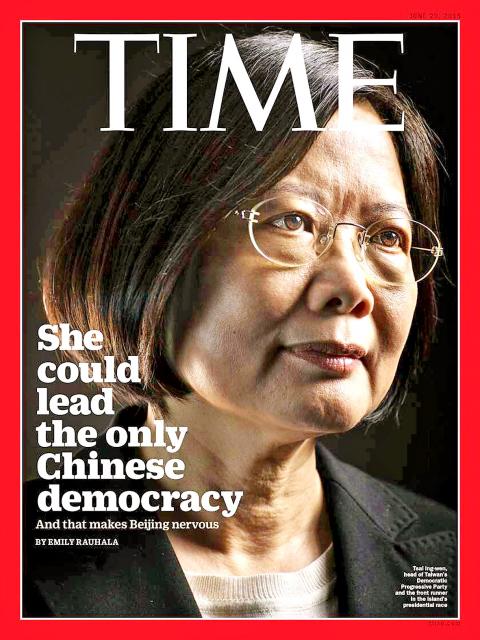The latest Asia edition of Time magazine is to print an interview with Democratic Progressive Party (DPP) Chairperson Tsai Ing-wen (蔡英文) — with the cover to feature her photograph — introducing her political background, while portraying her as a confident politician with a sense of humor.
“My purpose in giving the interview was to allow the international community to understand Taiwanese determination to defend values of democracy, and I’m glad that Time chose to make it a cover story and speak so much about the nation’s democratic development,” Tsai said on the sidelines of a campaign event in New Taipei City. “During the interview, I specially reminded the international community to pay attention to recent developments in Taiwan, especially after the Sunflower movement last year. Society now has a different expectation of the future.”
With the headline: “She could lead the only Chinese [sic] democracy,” a Time subheadline is to say: “That could make Beijing nervous.”

Photo: CNA
Tsai said it is a shared responsibility across the Taiwan Strait to maintain peace and stability.
“We want the international community to understand that it is everyone’s shared responsibility to maintain peace and stability,” Tsai said. “We especially stressed the DPP’s determination to maintain cross-strait peace and stability, and we hope everyone will work together to enhance stability and peace across the Taiwan Strait.”
In the interview, Tsai said that she would try to maintain the cross-strait “status quo,” while putting “Taiwan’s economy, development and culture first” in her policy platforms if elected.
She said that her policies would be Taiwan-centric, as opposed to President Ma Ying-jeou’s (馬英九) focus on pushing for new trade and tourism pacts with China.
The report said Tsai was “vague” on the independence-unification issue, as it was not made clear whether the DPP would repeal its stance on independence. On the issue of unificaiton, Tsai said: “It is something you have to resolve democratically — it is a decision to be made by the people.”
The interview said Tsai expressed confidence over her election chances.
Emily Rauhala, a Time reporter in Beijing who penned the article, said that Tsai offered her the last piece of tuna while they were at a Taiwanese-Japanese fusion restaurant in Kaohsiung and said: “Go back to Beijing and tell them you were served by the next president of Taiwan.”
“Tsai is quietly confident that she will gain the trust of Taiwan’s voters and secure victory, whatever Beijing might think,” Rauhala said.

SECURITY: As China is ‘reshaping’ Hong Kong’s population, Taiwan must raise the eligibility threshold for applications from Hong Kongers, Chiu Chui-cheng said When Hong Kong and Macau citizens apply for residency in Taiwan, it would be under a new category that includes a “national security observation period,” Mainland Affairs Council (MAC) Minister Chiu Chui-cheng (邱垂正) said yesterday. President William Lai (賴清德) on March 13 announced 17 strategies to counter China’s aggression toward Taiwan, including incorporating national security considerations into the review process for residency applications from Hong Kong and Macau citizens. The situation in Hong Kong is constantly changing, Chiu said to media yesterday on the sidelines of the Taipei Technology Run hosted by the Taipei Neihu Technology Park Development Association. With

CARROT AND STICK: While unrelenting in its military threats, China attracted nearly 40,000 Taiwanese to over 400 business events last year Nearly 40,000 Taiwanese last year joined industry events in China, such as conferences and trade fairs, supported by the Chinese government, a study showed yesterday, as Beijing ramps up a charm offensive toward Taipei alongside military pressure. China has long taken a carrot-and-stick approach to Taiwan, threatening it with the prospect of military action while reaching out to those it believes are amenable to Beijing’s point of view. Taiwanese security officials are wary of what they see as Beijing’s influence campaigns to sway public opinion after Taipei and Beijing gradually resumed travel links halted by the COVID-19 pandemic, but the scale of

A US Marine Corps regiment equipped with Naval Strike Missiles (NSM) is set to participate in the upcoming Balikatan 25 exercise in the Luzon Strait, marking the system’s first-ever deployment in the Philippines. US and Philippine officials have separately confirmed that the Navy Marine Expeditionary Ship Interdiction System (NMESIS) — the mobile launch platform for the Naval Strike Missile — would take part in the joint exercise. The missiles are being deployed to “a strategic first island chain chokepoint” in the waters between Taiwan proper and the Philippines, US-based Naval News reported. “The Luzon Strait and Bashi Channel represent a critical access

Pope Francis is be laid to rest on Saturday after lying in state for three days in St Peter’s Basilica, where the faithful are expected to flock to pay their respects to history’s first Latin American pontiff. The cardinals met yesterday in the Vatican’s synod hall to chart the next steps before a conclave begins to choose Francis’ successor, as condolences poured in from around the world. According to current norms, the conclave must begin between May 5 and 10. The cardinals set the funeral for Saturday at 10am in St Peter’s Square, to be celebrated by the dean of the College